
When Should You Do SEO? — Whiteboard Friday
The author's views are entirely their own (excluding the unlikely event of hypnosis) and may not always reflect the views of Moz.
Is SEO the right move for your business right now? This week's Whiteboard Friday video from Tom Capper tackles a fundamental question: when is the optimal time to do SEO, and what kind of SEO should you focus on? Get practical insights on essential elements like web presence and runway, plus considerations for brand building and content creation.
Click on the whiteboard image above to open a high-resolution version!
Happy Friday, Moz fans. Today, I want to talk about what might strike you as a basic question or an obvious question: when to do SEO and, to some extent, what doing SEO might look like.
Now, obviously, there are some generalizations here. I'm talking about rules of thumb.
Before I worked at Moz, I worked agency side as a consultant. And it was quite a common problem, and I think this happens, from what I've heard, in a lot of different SEO agencies and with a lot of different SEO consultants. The problem was, we would be approached by businesses that either wanted to do SEO but it actually wasn't the right time or the right investment for them to be making, or businesses that wanted to do SEO, had a specific idea about the kind of SEO they wanted to do, and again it wasn't actually the right fit. In these situations, we didn't feel comfortable selling that because maybe they weren't going to see results, and then that would reflect badly on everyone, and it would be a waste of money for them. I want to talk a little bit about how I think about these things, just in some general starting terms.
Need-to-haves for SEO
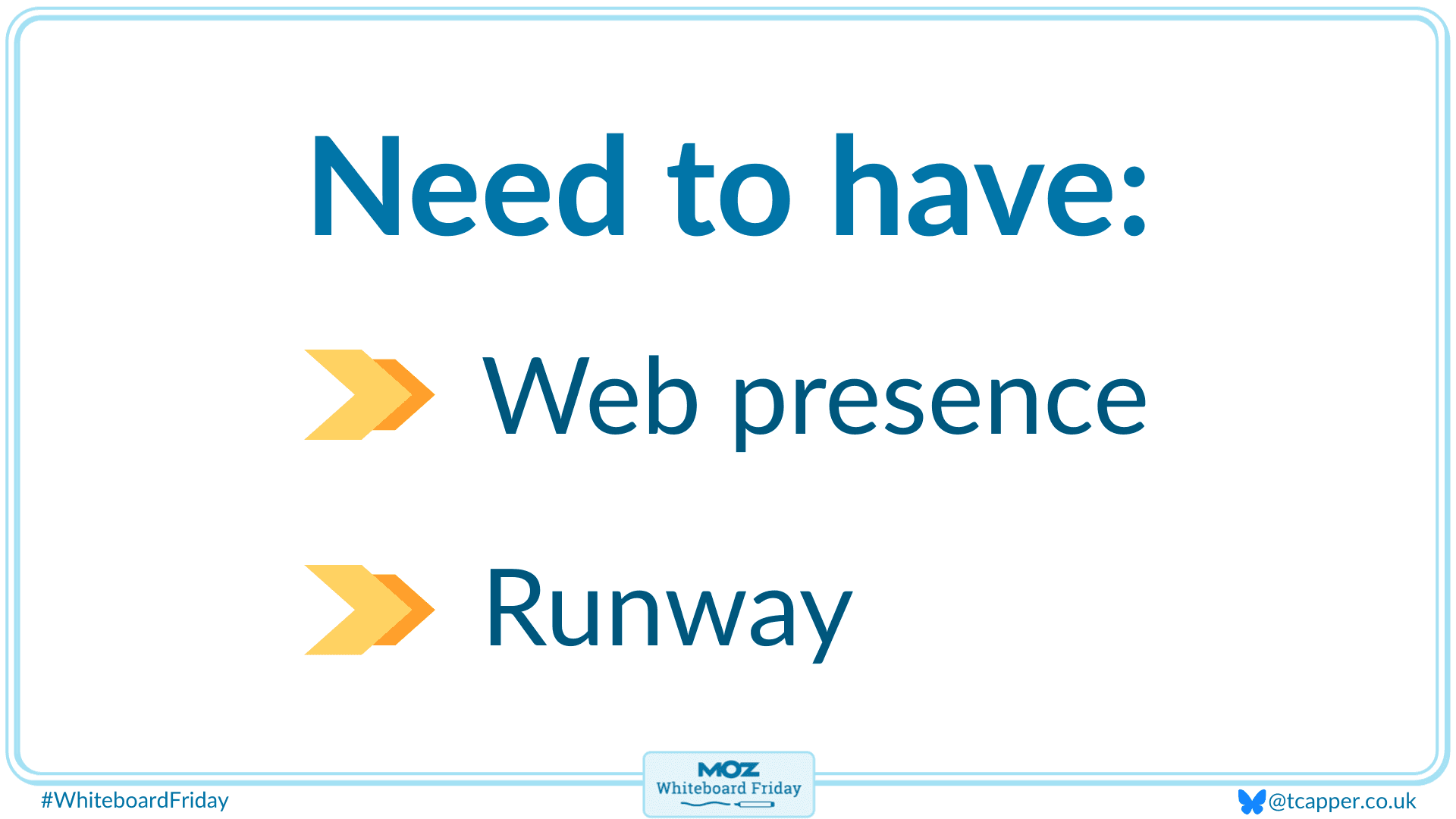
Web presence
So, absolute minimum, in order to do SEO, you're going to need to have some kind of web presence. Now, ideally, you're going to have your own website, right? Like that's the easiest. Then you definitely own all of the traffic that you get, and you can definitely make changes, and this kind of thing.
Understand the digital health of any website
With Moz DA/PA metrics

It is, of course, possible to do SEO without having your own website. You can do barnacle SEO, where you try to appear in directories or LinkedIn posts, or whatever it might be. Or you can try and do only local SEO, so you're trying to appear in Google Local listings without actually having a website referenced. But generally speaking, ideally, you're going to have a website. You need to have something, ideally a website.
Runway
The second thing that is, I would say, a need-to-have is at least some amount of runway. SEO is not a channel where you're going to get instant results the next day that will pay for themselves.
Partly it takes a while for changes or campaigns that you might pursue to take effect and to actually improve your performance in organic. And partly organic can be, isn't always, but can be a more top-of-funnel or middle-of-funnel orientated channel, so those people aren't going to instantly convert.
Now, there are exceptions here. But generally speaking, a good amount of runway is going to be important. How much runway that is, is obviously going to depend on your circumstances.
Nice-to-haves for SEO
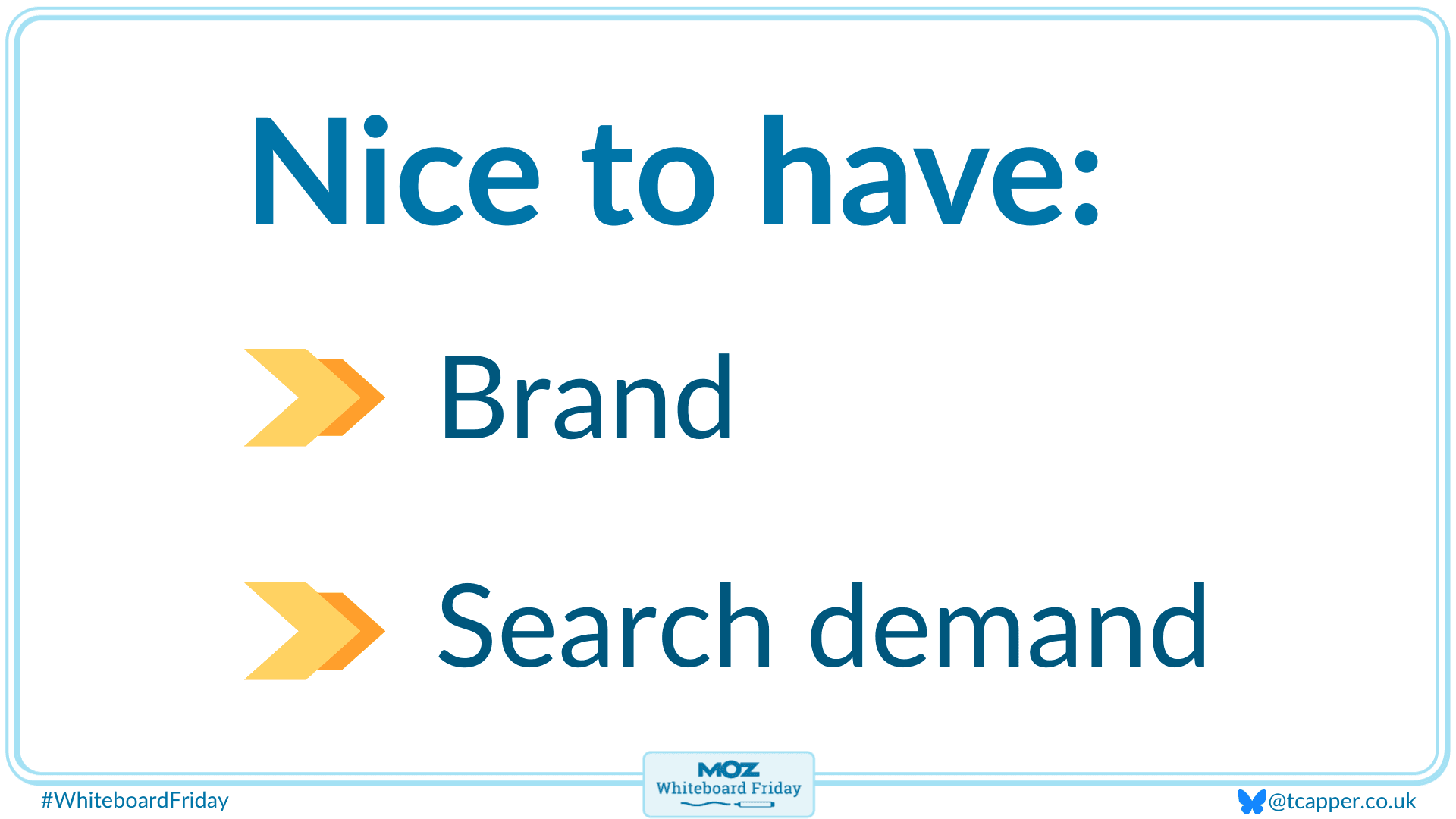
Nice-to-haves, so I would be very concerned about pursuing SEO or promising results from SEO without these.
Brand
So some kind of brand, you don't need this, but you do need this for some keywords.
I tend to think if you want to rank in the top few positions for a really competitive term, most of the time you are going to need a brand that people recognize and are comfortable with to do that. There are some exceptions, some verticals where basically nobody has a brand, and so even the most competitive terms, you can go for. But generally speaking, and I've put out data on Whiteboard Fridays and on the Moz blog in the past, showing that the more competitive the term and the higher you rank, the more it becomes really a necessity to have a strong brand, especially with some recent algorithm updates.
How strong is your brand?
Calculate your Brand Authority with precision in Moz Pro

Search demand
Again, a nice-to-have, and you can work without this, but it's difficult, some search demand. People need to be searching for what you are selling. If they're not, you can do the kind of campaign where you try to rank for related terms.
Say I've just invented a new masonry-based vegetable substitute, so you can just eat masonry all day. Nobody is searching for this, right? Nobody is searching for masonry-based vegetable substitutes. So I might try and rank for vegetarian recipes, and then people will discover when I talk about my masonry-based vegetable substitutes in my article. Obviously, I don't sell this product and it shouldn't exist. But it's much easier if you do already have keyword volume for the thing that you're actually selling.
Again, it's not absolutely necessary, but it's definitely a nice-to-have. I'd be very cautious about recommending someone pursue SEO as their main marketing channel that didn't have this to work with.
Who shouldn’t bother with SEO?
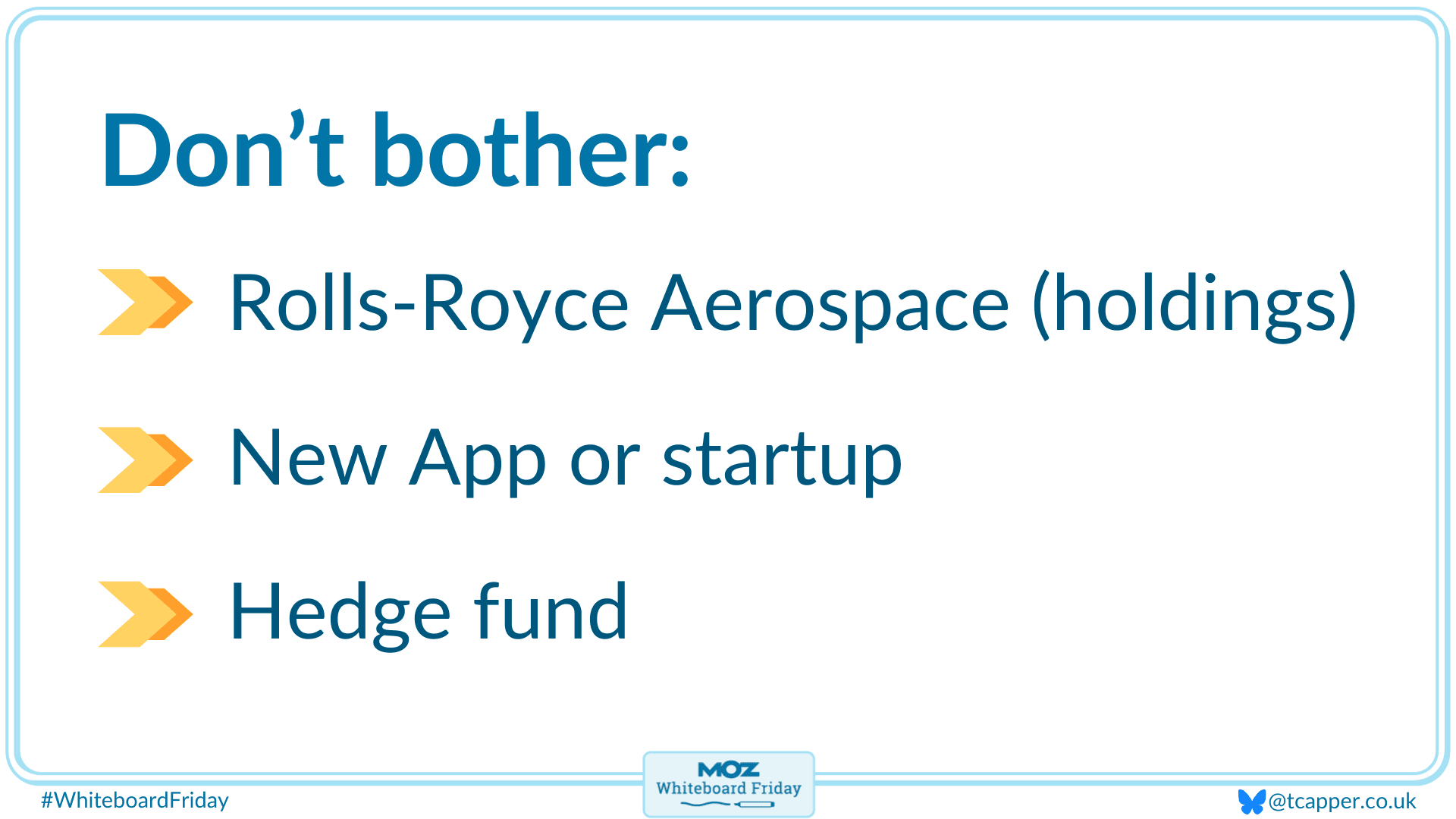
So some examples of businesses I would say probably shouldn't bother.
Rolls-Royce Aerospace
Rolls-Royce Aerospace are actually called Rolls-Royce Holdings PLC, I think technically. So this is a company that sells small nuclear reactors and jet engines. I would say that when governments, militaries, whoever else wants to buy this kind of thing, they're probably not googling it, right? They have existing connections. They know who to ask. There might be ways in which Rolls-Royce want to improve awareness and visibility in the industry or with the general public. Those probably still don't really look like SEO.
Now I'm not saying that they shouldn't have a website, or that they should pay zero attention whatsoever. But I definitely wouldn't be recommending if Rolls-Royce want an effective marketing campaign, it probably shouldn't be SEO led.
New apps and startups
New apps and startups, so this was a common thing when I worked agency side. We didn't get many inquiries from Rolls-Royce, unfortunately, but we did get a lot of inquiries from brand-new apps and startups. Maybe they have funding, but they don't have any customers yet, this kind of stage. Often they need results so quickly and they have such little to work with in terms of existing brand or authority, that SEO is just not the best channel for them to start with. If they've got the budget to do one marketing channel to start out, it probably shouldn't be SEO.
Maybe when they've built a bit of brand, they've got some customers, it's got some recognition, they're being talked about a little bit, and they've got some more content on the website, maybe then it makes sense to start thinking about SEO as their second or third marketing channel that they take seriously, but probably not the first.
Hedge funds
And lastly, hedge funds. So I'm just using this as an example of a business that doesn't really do acquisition marketing. That's just not how they function. They're not trying to attract customers in that same way. They might try and attract investors or whatever through word of mouth, but they're not trying to attract customers in that way. They might want to take advice from people who do understand SEO, but they're not going to probably pursue their own SEO campaigns.
So those are some examples of people I think shouldn't bother.
How to determine the right kind of SEO campaign to pursue
What if you're one of the businesses, and I think it is most businesses, that should engage with SEO? So the next step is are they trying to pursue the right kind of campaign?
Now I must be honest here. I don't know who came up with it first. Charts like this is often how I've thought about this kind of problem. But I've definitely seen other people use them as well. So I've seen them from Aleyda, from Mark Williams-Cook. I have no idea who came up with these first. So apologies to whoever I'm originally copying. But I've tried to take my own spin on it, and this is more how I think about this.
Decide between on-site and off-site SEO
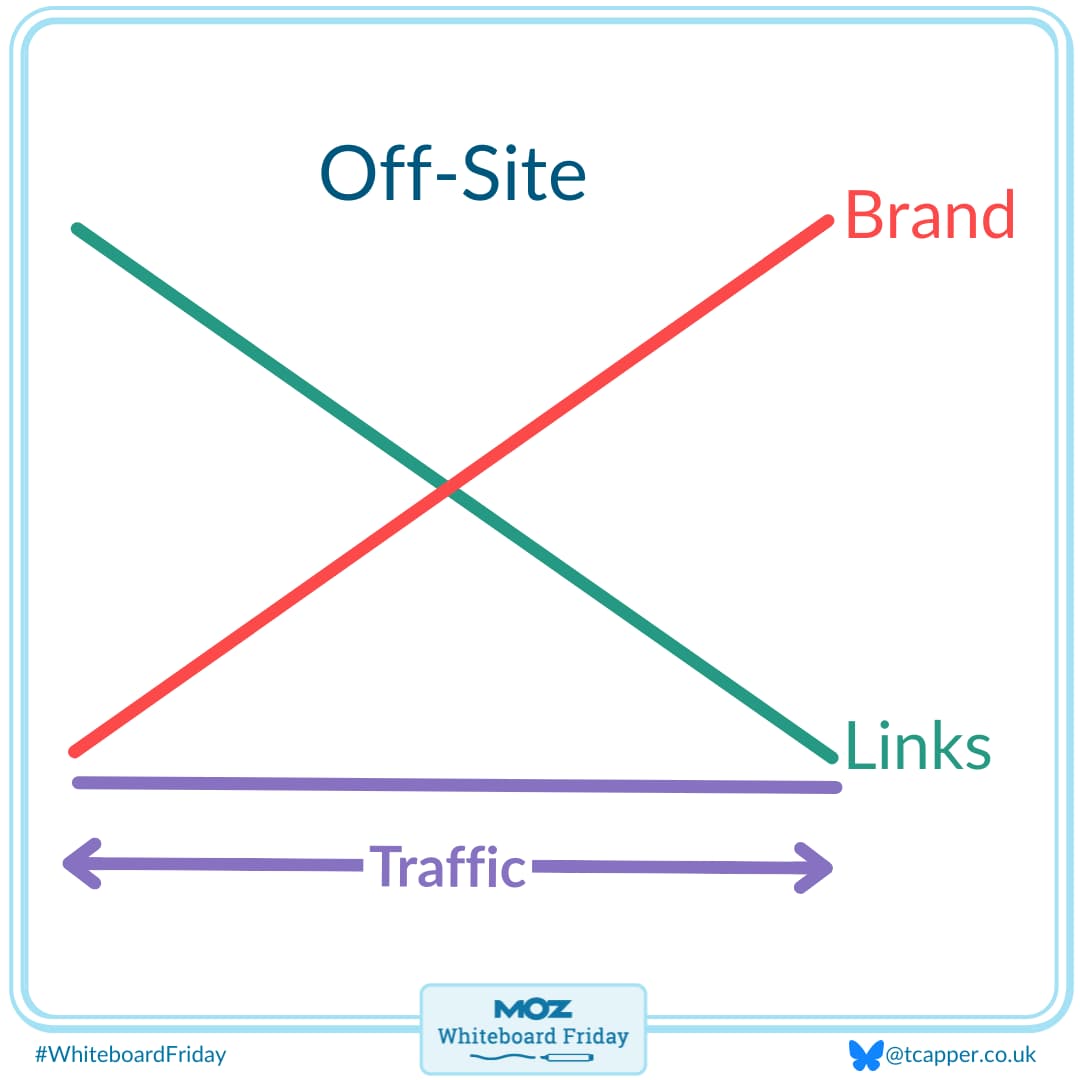
So step one is decide whether you should prioritize on-site SEO, so you're making changes to your own website, or off-site SEO or some combination. I've used Brand Authority as a sort of indicator here. I tend to think the more established you are, the higher your existing Brand Authority, probably the more existing presence you have, the more that on-site SEO is going to be more rewarding.
Now you've already gotten into that competition at the top of the most competitive SERPs. Do you really need to do more brand building, more link building at that stage? Probably a little bit, but it's not going to be your main concern. It's more about making sure that people who land on those pages find what they expect to find and have a good experience, that you're ranking for the right term, and this kind of thing.
Discover your money keywords with Keyword Explorer

On the other hand, if you're a very new business, maybe you've only been around for a couple of years, you've been pursuing some other kind of marketing channel, and now you want to try organic, you're just not going to register. Whatever content you put out, it's going to take a very long time for it to appear. Google is not going to take it super seriously. You're not even going to be in the running. In these cases, off-site SEO, whether it be PR or brand campaigns or link building, whatever it might be, that's going to be more relevant, if you're at that very early stage.
Choose your key focus
So once you've decided which of these or as I say probably some combination you're going to do, I think it divides out again.
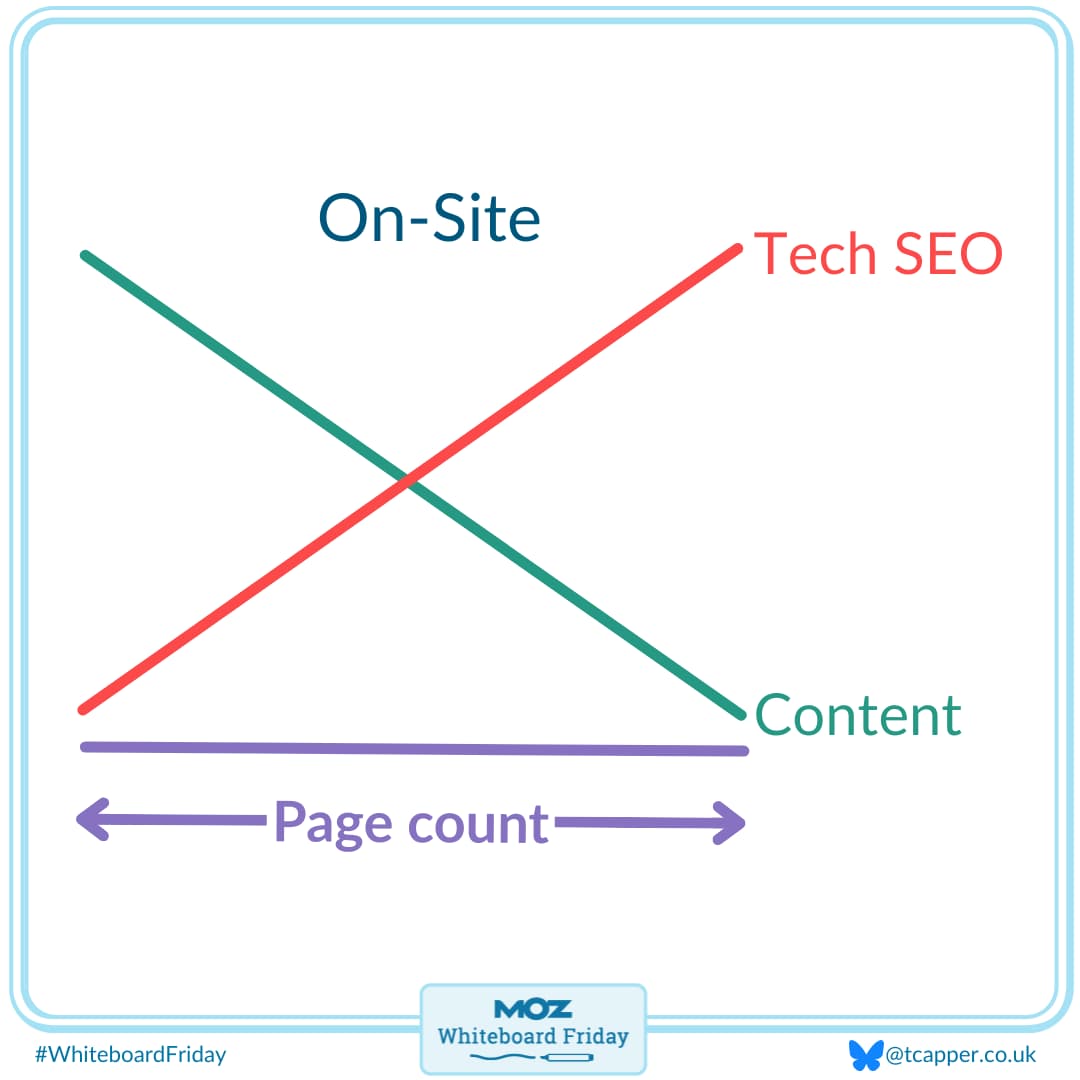
So if you end up doing off-site, you're going to want to decide whether your key metric is going to be focused on brand or links. I think this has to do with basically how much traffic you have. Again, if you're a very young site, your off-site work probably looks like link building to try and get search engines to notice you in the first place.
If you're a more mature site and you're trying to make your way up from ranking third to first for these terms that you really care about, it's probably going to look like more about brand building, about recognition, about people choosing to click on you when they see you in the SERPs, about Google seeing people search for your brand plus the head term and this kind of thing.




